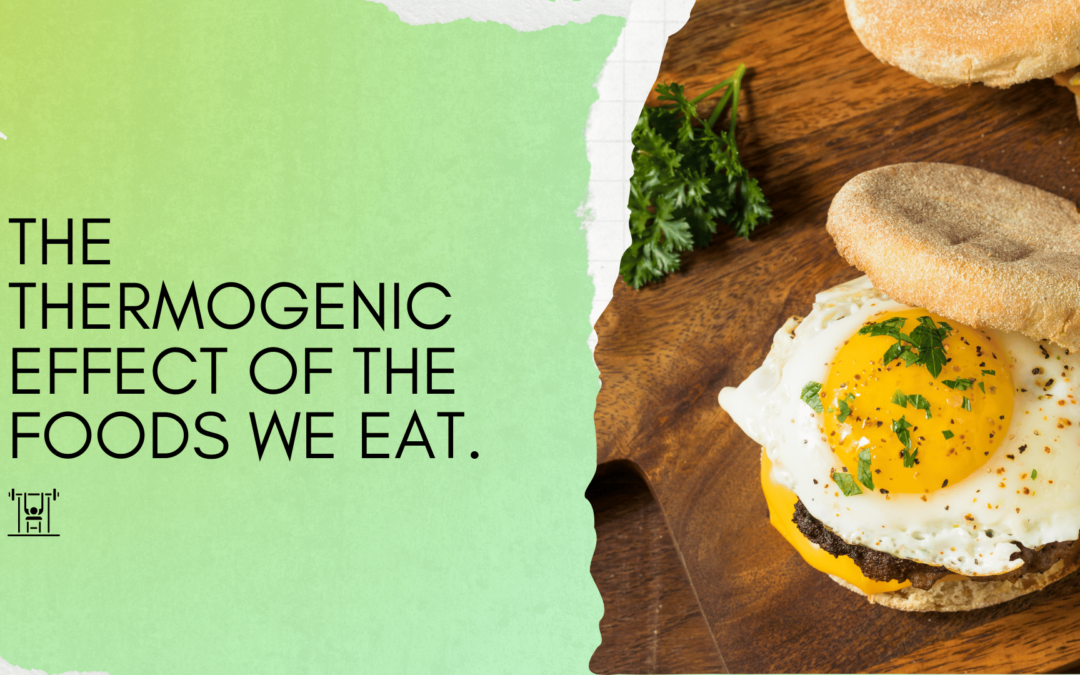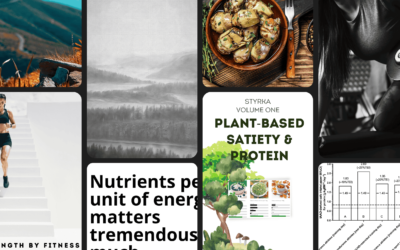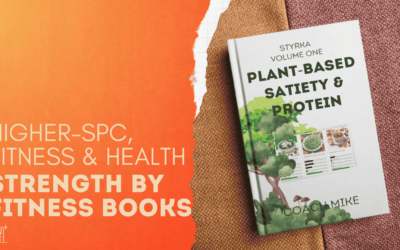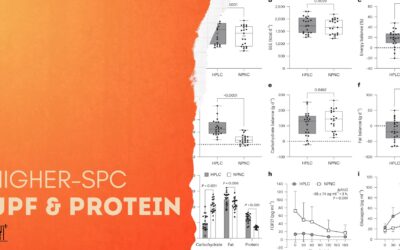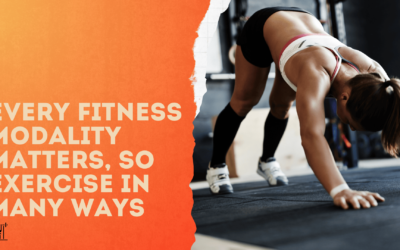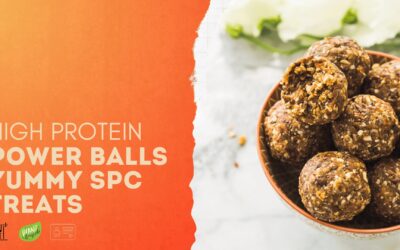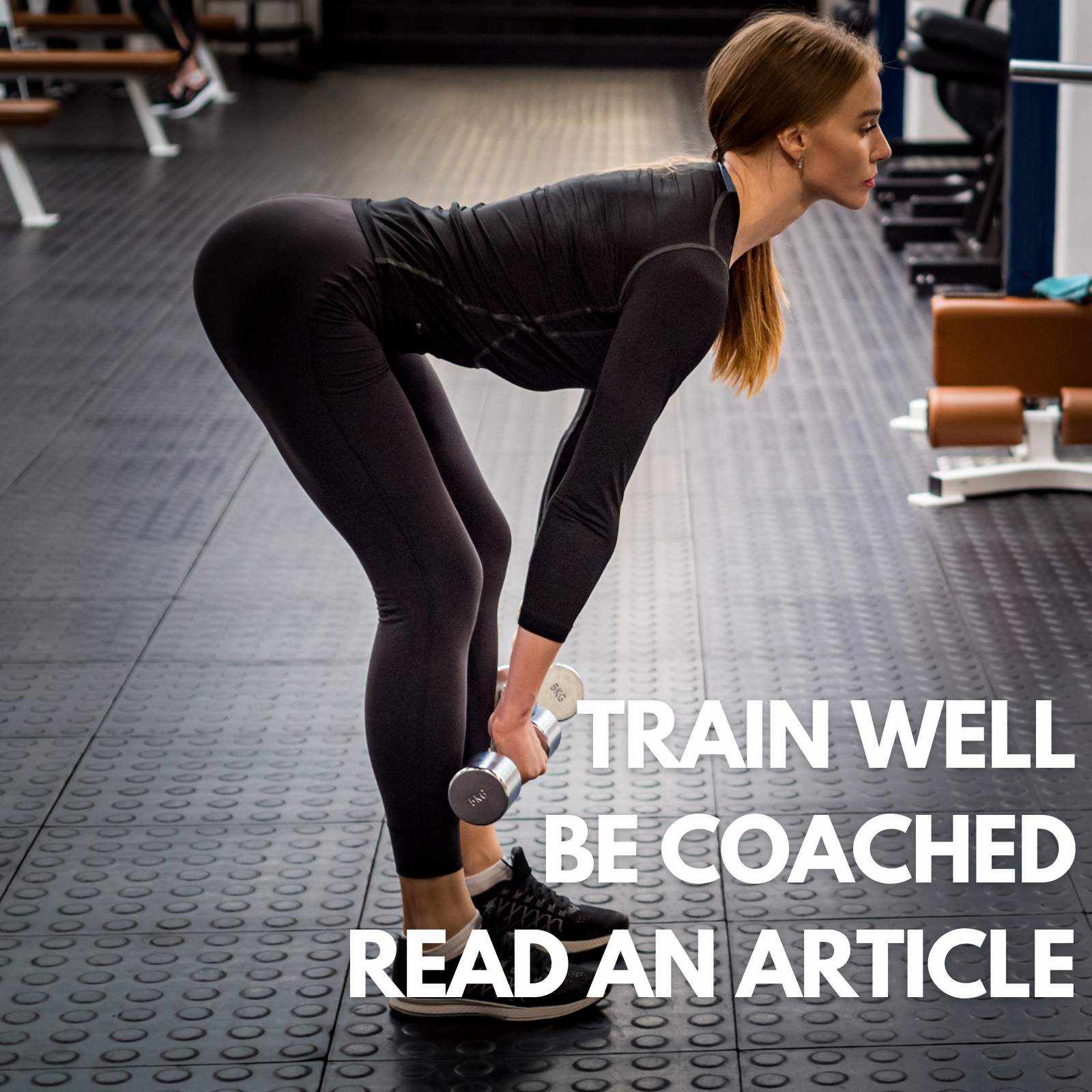
Strength By Fitness
Let us talk about the thermogenic impact of the foods we eat. TLDR: With the exception of eating more protein, it is 100% inconsequential.
Welcome to another fact-based article from Strength by Fitness.
If you have been harboring a brief innate hope that I would peel the wool out of your eyes and reveal a mythical world of thermogenic foods that magically burn away your body fat even if you are eating in a caloric balance or surplus with this article. I have bad news for you.
Because the reality is that there are no teas or natural foods that can increase your thermogenic ‘burn’ to such a degree that it has a meaningful real-life impact on your fat loss if you are stuck in an excess energy, food intake.
So that wont happen.
Nor can any food that you eat magically turn an excess food intake into a body fat, and body mass-losing process. The one exception to this is choosing to consume high-protein & fiber-rich foods since these are the nutrients that on one hand increase satiety the most, which makes us eat less in total, and on the other hand require the most from our bodies in order to be absorbed, processed and stored.
So a food approach that is rich in high protein & fiber will almost automatically make you eat within your real energy balance, while also providing you with a small, but real thermogenic effect, and much-needed nutrition for your entire body, all of its processes, muscles and organs.
The Thermogenic Effect Of Foods & Nutrients Is Real, But Massively Overhyped.
I am making this short, fact-based article because I keep seeing people, even seemingly confused coaches, talk about their thermogenic food choices and various levels of proclaimed fat loss, and I am sorry to be blunt, but that is just not true.
There is only one food approach that will increase the odds of you eating within your energy balance, while also providing nutrients that require more energy to be absorbed and be much harder to store as body fat, and that is the highly beneficial outcomes of high-protein, high-satiety food plans.
So please do not waste your time, or repeat non-factual myths that lemon water, spicy food, and similar is good for your real-life fat burn. Lemon water is a good choice for many other reasons, as is any other clean, safe glass of tap water or black coffee, but there is no real life thermogenic effect to talk about.
The foods we eat, and their nutritional content matter greatly because of their impact on our health, and fitness. Our body composition, hormones, recovery, well-being, brain, organs, strength, endurance, and many other biological processes.
But here it is in short.
While some foods, do have a thermogenic impact it is so minuscule that it is inconsequential for your fat mass. This mirrors how high protein diets are wonderful for maintaining and building more lean muscle mass for people that go to the gym, but really don’t help anyone build or hold on to muscle mass if they are sedentary non-gym goers that are walking around in a caloric deficit.
Likewise, high-protein diets automatically make most people eat less, so much so that most of the time it makes the act of remaining within your energy balance a non-issue. High-protein food plans are in other words amazing for losing excess body fat & especially when you combine them with exercise since they also maximize strength, recovery, health, and lean muscle mass progression.
But, if you are really, really determined to overconsume food, no matter how much protein you eat you will in that case be able to consume an excess amount of nutrients, excess nutrients which will perpetually pile on excess body fat.
If you doubt this claim, just take a look at your garden variety, competitive, heavy weight strongman.
So what we have is the following
A. Protein has a very high satiety score, while also being obnoxiously hard to absorb and process for the human body. This is great. As is the fact that the human body really does not want to store protein as fat. So meals rich in protein benefit human health, fitness, aging, body composition, recovery, fat loss and capacity. Making it very easy for most people to eat within their natural energy balance when they adopt a high-protein food approach.
B. But if you still overconsume your total food intake no matter the protein content it won’t magically burn away the excess body fat that you do have.
C. Excess food intake is however much less likely to happen on a real, health-oriented high-protein plan. So protein is the one thermogenic nutrient that will make life easier if you eat a proper high-protein diet ( 1.6 grams of protein per kilo of body weight and day for omnivores, 1.8 for plant-based people. Use target weight if obese or very overweight ).
All the others, such as tea, coffee, and spices will do nothing worthwhile for your fat burn unless you are already in an energy deficit.

What you eat matters. It´s nutritional content, and completeness, the quality, the amount of protein, and it´s sustainability.
Our food choices matter, but there is a fact-based context to it, and no food type or food-related effect is so big that it can make you build muscle mass if you do not train, and it can’t make you burn body fat if you are in a total nutritional intake surplus or even eating at a balance
The fact-based process of losing body fat and body mass only means that the total sum of what you are eating is ( hopefully ) nutritionally healthy (and this is equally important for your long-term development, nutritionally complete) while also being low enough relative to your ongoing needs to put your body in a caloric deficit.
No matter who you are, no matter how much or little you eat on a daily basis, and no matter how healthy anyone is eating. No matter how little or how much we exercise, the fact-based reality is that if you are losing body fat you are simply consuming and absorbing less total nutrients than what your body is using up.
This simple fact does not even change if you are put on medications such as Ozempic, because Ozempics biggest difference maker is that it makes you eat less.
End of story.
The basic things I have said here hold true for extreme athletes like Phelps when he managed to be fit and eat roughly 10,000+ calories per day, and it holds true for that toned fitness model who eats 1200 calories leading up to a shoot.
It’s equally true for that fit 45-year-old soccer mom you check out in secret at the games with toned legs, glutes, and flat abs that eat roughly 1700 calories per day, and it’s just as true for that beefy gym guy who always has big, and strong visible muscles and a healthy lean fat percentage all year round while eating 2900 calories per day.
And guess what, it’s the same for the sedentary person who never loses fat despite only eating 2300 calories per day.
The thermogenic real-life approach. Pile up protein & fiber, eat nutritionally complete quality foods & enjoy high-satiety meals.
While there are many fact-based aspects that do go into the trajectory of our ongoing health, and fat mass, our fitness progression, strength, muscle mass, cardiovascular health and capacity.
Not to mention our visual and measurable body composition, here is the fact-based reality of it all.
If you have been losing fat mass ( including some water and body mass ) then you have simply managed to stay in a nutritional energy deficit long enough for it to have an impact on your body mass.
This might correlate to your body weight.
But our body mass changes, such as fat and muscle mass, and the body weight we see on the scale do not always correlate, and whatever thermogenic tea or foods or spices that you consume has had no practical impact of importance outside of being tasty, healthy and very low caloric.
—
Yes, some foods, spices, and teas do have a thermogenic effect, but just like your testosterone increases acutely following a strength training session neither of these real outcomes has a meaningful impact on your ongoing, long-term fitness or body mass and body composition changes.
There are only three nutrients with a real impact on your fat loss and lean muscle mass progression, those are protein, fiber, and creatine which all three have a very real, all-year-round, real-life impact on your body mass.
Be it muscle mass or fat mass.
Lean muscle mass.
You build strength and muscle mass when your nutritional intake is good enough and big enough and your resistance-based workouts and activities are good enough and regular enough.
Similarly, you are guaranteed to lose body fat, and body mass when your fitness routines, physical activities, and daily life exert and demand more energy than the total intake of daily nutrients measures up to while providing sufficient enough rest, sleep, and recovery for your body to work its fact-based magic.
—
The Question.
Could thermogenic teas and other foods and spices have any impact on this fact-based cause and consequence outcome of your lifestyle?
No, not in a meaningful way as far as your body fat goes.
However, as humans we have to consider our enjoyment. Habits that we enjoy last over time. So perhaps eating spicy foods is just that tasty for you, and perhaps you are drinking that tea instead of soda and bullet coffee, wine, and cream-infused milk smoothies and drinks?
Or whatever the excessively nutritionally denser food and drink would have ended up being.
If so it is an excellent low-caloric beverage choice with some healthy amounts of micronutrients.
So keep on enjoying food choices that make it easier for you to stay with a nutritionally healthy and nutritionally balanced high-protein, high-satiety food plan, because that matters greatly.
Just do not propagate the wrongful idea that other thermogenic foods, such as teas, spices, cold water, and lemon-infused water have any real-life impact on anyone’s body fat loss.
How about protein versus carbs or fats?
Having said all this, I have to reiterate the benefits of the high-protein factor.
When we speak of macronutrients protein will have a much more beneficial effect on your lean body mass ( and health ) relative to fats and carbohydrates.
Meaning this, a high-protein food plan that is healthy in every other way will allow you to get more micronutrients and satiety-boosting macronutrients into your body for the same amount of calories that a heavy fat-based food plan would.
Likewise, a high protein food plan will benefit an increase in strength and lean muscle mass much better than a high carbohydrate food plan would for the same amount of calories.
Simply because protein is A. The building block that is needed to maintain, repair and form new skeletal muscle mass, organ and bone mass. B. A high fat or carb food plan with the same total amount of calories would also have less room for enough proteins, something that holds even more true for fat rich foods due to fat holding more than double the amount of energy compared to protein and carbohydrates.
Another point that greatly matters is the importance of getting enough protein to boost better strength and lean muscle mass progression by quite a margin. Making it far easier to remain healthy and fit while having a healthy amount of body fat. Something which neither fats or carbohydrates contribute towards in any comparable way.
Sure, fats are essential, and good essential fats allows our bodies and biological processes to remain healthy and well functioning, including the way we process, absorb and store food and body fat. Likewise, quality carbs provide meaningful energy for intense strength training and better recovery.
But protein is far more beneficial for sculpting, and maintaining a healthy, lean body, as well as creating that highly satiating, high quality food life with nothing but positive health outcomes.
Protein do provide a real thermogenic effect.
With that, I mean that 1 gram of fat boosts your caloric intake with roughly 8 to 9 calories, and 1 gram of protein or carbohydrates will only add about 4 calories, but protein is by far the hardest macronutrient for your body to absorb, this means that you are not actually storing 4 calories per 1 gram of protein. Fat and high-quality carbs on the other hand get easily absorbed, processed and stored as energy, with the exception of whole plant-based fiber which is even harder for our bodies to process than protein.
This is one reason that whole plant-based foods are so beneficial for a slimmer body composition and a healthy fit life. Especially so when you add whole plant-based foods with plenty of fibers to your high-protein meals.
Macro and micronutrients are, of course, not individual meals per se. But, it´s the nutritional content that makes up our meals that determine its real benefit, cause and consequence.
—
So, my advice is simple.
Forget about the mythical thermogenic teas and foods, outside of protein the real-life importance of thermogenic foods is inconsequential, its less than an atom compared to the mountain you should focus on. Instead, simply settle for healthy foods with a high amount of protein and fiber ( 1.6g of protein/kg/day protein omnivores, and 1.8 minimum for plant-based or higher if it fits your lifestyle ). Make sure you get the healthy fats you need and fill up the rest with nothing but healthy, high-quality carbohydrates from whole plant-based foods.
Unless you really thrive on high fat. If so, combine high fats and high protein with moderate to low carbohydrates.
This big pillar approach to food choices, fitness, recovery and habits will allow anyone who ever lived to get stronger, healthier, fitter, more durable, and much healthier. While having a much easier time reaching and maintaining whatever healthy body fat level they wish for because it is the big pillars that drive most of your progression, all while the minor fluff, like drinking cold water and spicy foods might at best help your life-long progression with 1%.
You can find our podcast on Spotify & YouTube, or deep-dive into the referenced studies behind this article by Coach Mike, you can also read our paywalled articles on Medium if you prefer that option.
Cited studies
Protein and resistance training based fitness. Comparing RDA vs high-protein plans, health markers, strength and hypertrophy.
1. Difference in fitness progression between RDA and 1.6g protein per day and kilo of bodyweight.
2. Resistance exercise variables affecting strength and hypertrophy.
https://www.sciencedirect.com/science/article/pii/S2095254623000601?s=09
3. Study of muscle mass quality and metabolic health.
strength by fitness
podcasts
recent articles
Homemade Oats & Banana Protein Bars
Strength By Fitness delivers the perfect & healthy homemade protein
bar with this easy-to-make higher-SPC recipe.
Our protein bar exists somewhere between a protein-rich banana bread and fiber-rich oat bar. As such this bar delivers healthy nutrients, higher-SPC, and plenty of protein. There are, as always with our recipes, several main protein sources. 100+ grams of protein and a good SPC range around 50.
High-protein and endurance athletes.
THE HIGH-PROTEIN FOOD APPROACH THAT STRENGTH BY FITNESS HAS BEEN CHAMPIONING AND COACHING FOR THE PAST DECADE.
Our nutritionally rich high-protein, higher-SPC coaching is not just for the elderly, or the obese, and perpetually overweight who need better habits that are possible to adhere to long-term. Neither is it just for the many strength, muscle, and power-focused fitness-loving people, and athletes that regularly show up all year round in the gym no matter their age.
No, on the contrary, the nutritionally rich high-protein approach you see Strength By Fitness talk about, and coach is just as beneficial for endurance-loving athletes and enthusiasts too.
STYRKA Books, Strength By Fitness Fact-based Book Series.
In STYRKA VOLUME ONE, the first of Strength By Fitness fact-based series of books we are inviting you to a realm of healthy food plans and recipes, fitness facts, health science, sleep, recovery, endurance, strength, habits, and more.
Look forward to a complete approach to plant-based eating with a clear focus on maximizing and improving health, aging, and fitness progression over time. This book is delivered with a complete 7-day food plan and a wide library of swap-in meals so you can create a lifelong food adventure with nothing more than this book as your foundation.
Coach Mike further explains the ins and outs of a nutritionally complete high-protein, higher-SPC food approach, no matter diet tribe preference.,
You will also touch base with our fact-based big pillar coaching ideas across fitness, recovery, health, habits, sleep, and nutrition, and many cited studies to back it all up.
In short, STYRKA Volume One provides you with all the tools you need to create vastly better health and fitness progression, food and lifestyle habits, and the body composition and athletic capacity that you strive to achieve.
Comparing SPC, UPF & Protein Levels, Fact-based Outcomes.
IN THIS ARTICLE, COACH MIKE EXAMINES TWO CONTRASTING HIGH-PROTEIN INTAKE STUDIES, ONE FROM 2005 AND ANOTHER FROM 2025. DEMONSTRATING HOW THEY RELATE TO AND ULTIMATELY VALIDATE YOUR HIGH-PROTEIN, HIGHER-SPC LIFESTYLE.
I’ll begin by introducing SPC (satiety per calorie), a modern food metric, and explain its relevance to a study conducted two decades ago. We will after that delve into the impact of ultra-processed foods (UPF) on overall food consumption and compare outcomes between a high-protein UPF intake and a lower-protein UPF intake under ad libitum feeding conditions. This comparison will illuminate how these findings fit into the broader fact-based SPC food approach.
All Fitness Modalities Matter As They Provide Unique Benefits.
All fitness modalities provide a big overlap of benefits & unique health & fitness outcomes. Training across all modalities makes you fitter & healthier. It will not hold you back.
Coach Mike, Strength By Fitness.
Welcome to another fact-based article from Strength By Fitness. today, we are taking a look at the beneficial outcomes of strength training together with aerobic exercise relative to doing just one of them.
Members & Clients Recipe: Plant-based Protein & Fiber Balls. Health & Fitness Friendly High-protein, SPC snack.
Plant-based Protein & fiber Balls. Rich in nutrition, high in protein, and SPC. Yet indulgent & tasty. Another Strength By Fitness winner that's exclusive for our paid members & Clients. Sign up today to enjoy our exclusive fact-based articles and recipes.
SPC 66 to 80. Protein 65, healthy fats, carbs & fibers, prep, cook, and store in the freezer.
We appreciate you
so stay healthy & never stop training
Contact
Private In-App Messaging is Available For All App + Coaching Clients
Adress
Coaching
Available Online on IOS & Google Play, and In-person.
